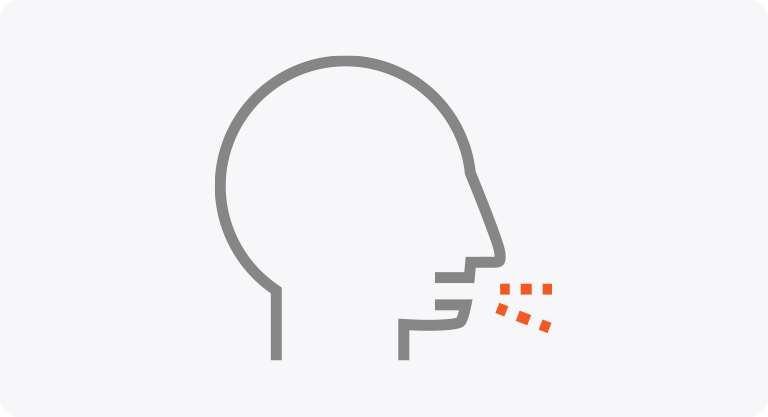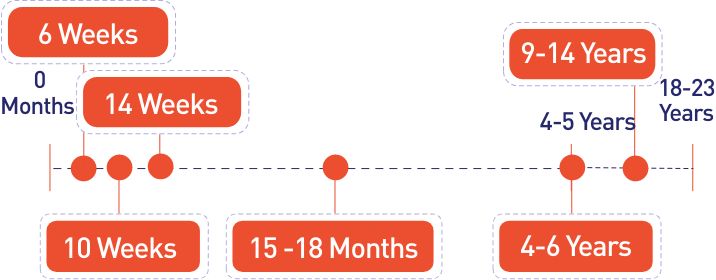Babies can get infected with Pertussis in the first few weeks after their birth. Pregnant women can get themselves vaccinated for Pertussis, through which they may pass on antibodies to their child before birth.

You are now leaving GSK’s website and are going to a website that is not operated/controlled by GSK. Though we feel it could be useful to you,we are not responsible for the content/service or availability of linked sites. You are therefore mindful of these risks and have decided to go ahead.
Agree Agree Agree Stay

Pertussis is also known as Whopping Cough. It is a contagious respiratory infection and can be prevented by vaccination.
Ensure your child's health with the Pertussis vaccination - one of seven essential shots they need. Pertussis, also known as whooping cough, is a highly contagious respiratory infection that poses a significant risk, especially to young children.
Symptoms like severe coughing fits, vomiting, and exhaustion can occur if infected. Early vaccination builds immunity, preventing your child from illness and discomfort. Talk to a pediatrician today to learn more about the 7-Star Protection program and ensure your child is completely immunized.

If you miss out the dose of these vaccinations during the stipulated time, you can consult with your doctor for a Catch-up Vaccination.
Talk to your doctor about the Pertussis Vaccination.
Pertussis is a respiratory infection caused by the bacteria Bordertella pertussis. The disease is highly contagious. The bacteria attaches to the cilia, which are hair-like tiny extensions in our upper respiratory tract. Here, it releases toxins that damage the cilia.
An infected person can have uncontrollable violent coughing which makes it hard to breathe. The disease may prove fatal in neonates.
Pertussis is contagious and can be passed on from an infected person to others through respiratory droplets or when sharing space with them. It is usually passed on by coughing, sneezing, or close contact. Infected individuals are contagious for up to 2 weeks after the cough begins.
Infants risk infections from carriers who come in contact with them, such as caregivers, parents, and siblings. These individuals may not be showing symptoms.
Pertussis symptoms can take anywhere between 5 to 10 days to develop after exposure. In some cases, symptoms may not show for up to three weeks.
Early symptoms of Pertussis may appear similar to the common cold. These may last for 1 to 2 weeks. According to the CDC, some of the common symptoms include:
In the next stage, symptoms may evolve to:
Coughing fits could last for about 10 weeks. One of the signs of recovery is when the coughing becomes milder and less frequent. But the recovery may happen slowly.
Pneumonia is relatively common in infants and children but seizures and brain disease occur rarely.
Pertussis vaccination is available in combination with tetanus and diphtheria. According to Indian Academy of Pediatrics (IAP) Advisory Committee on Vaccines and Immunization Practices (ACVIP), the vaccine is administered in three doses, at the following ages:
Furthermore, booster doses are to be given at the ages of 16-18 months and 4-6 years.
Tdap (reduced antigen combined tetanus, diphtheria and acellular pertussis) at 10-12 years.
Booster doses (Tdap) are required for adults as well.
Please consult your paediatrician for more information.
However, consult your doctor for more information.
Pertussis vaccinations may cause mild symptoms such as soreness, redness, or swelling at the site of the injection.
In case of severe symptoms, consult your paediatrician immediately.
For more details on side effects, please consult your doctor.

Babies can get infected with Pertussis in the first few weeks after their birth. Pregnant women can get themselves vaccinated for Pertussis, through which they may pass on antibodies to their child before birth.
A public awareness initiative by GlaxoSmithKline Pharmaceuticals Limited. Dr. Annie Besant Road, Worli, Mumbai 400 030, India.
Information appearing in this material is for general awareness only. Nothing contained in this material constitutes medical advice. Please consult your doctor for any medical queries, any question or concern you may have regarding your condition. The disease list indicated for vaccination is not complete, please consult your child’s Paediatrician for the complete vaccination schedule. The doctor shown in this material is being used for illustrative purpose only and is a professional model. The disease representation icons/images and animation are for illustrative purpose only.